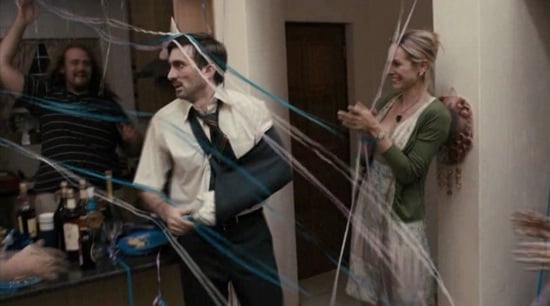Shocking Blocking (12)
By:
January 21, 2011

The sci-fi thriller District 9 (d. Neill Blomkamp) takes as one of its central themes the ironic/tragic insight that nothing short of our own dehumanization will ever suffice to convince most of us to think and act in a humane fashion. Wikus van de Merwe (Sharlto Copley), a clueless Afrikaner bureaucrat at Multinational United, a sinister Blackwater-like corporation, doesn’t empathize with the alien “prawns” — the forcible relocation of whom, from one refugee/internment camp to another, he’s tasked with — until [SPOILER] a DNA-altering mishap begins to transform him physically into an alien being. In another director’s hands, Wikus’ existential trajectory (familiar to readers of, say, Levinas, Kafka, or PKD) might have been introduced ham-fistedly. However, even before he grows a prawn-flipper and eats catfood, our protagonist’s alienated perspective is foreshadowed, in the scene shown here, via blocking. At a surprise party, Wikus finds himself surrounded by friends and family, covered with celebratory streamers; instead of rejoicing, he seems a creature hunted by a species higher up the food chain. He’s a prawn trapped in a net!
An occasional series analyzing some of the author’s favorite moments in the positioning or movement of actors in a movie.
THIRTIES (1934–1943): It Happened One Night (1934) | The Man Who Knew Too Much (1934) | The Guv’nor (1935) | The 39 Steps (1935) | Young and Innocent (1937) | The Lady Vanishes (1938) | Mr. Smith Goes to Washington (1939) | The Big Sleep (1939) | The Little Princess (1939) | Gone With the Wind (1939) | His Girl Friday (1940)
FORTIES (1944–1953): The Diary of a Chambermaid (1946) | The Asphalt Jungle (1950) | The African Queen (1951)
FIFTIES (1954–1963): A Bucket of Blood (1959) | Beach Party (1963)
SIXTIES (1964–1973): For Those Who Think Young (1964) | Thunderball (1965) | Clambake (1967) | Bonnie and Clyde (1967) | Madigan (1968) | Wild in the Streets (1968) | Barbarella (1968) | Harold and Maude (1971) | The Mack (1973) | The Long Goodbye (1973)
SEVENTIES (1974–1983): Les Valseuses (1974) | Eraserhead (1976) | The Bad News Bears (1976) | Breaking Away (1979) | Rock’n’Roll High School (1979) | Escape from Alcatraz (1979) | Apocalypse Now (1979) | Caddyshack (1980) | Stripes (1981) | Blade Runner (1982) | Tender Mercies (1983) | Monty Python’s The Meaning of Life (1983)
EIGHTIES (1984–1993): Repo Man (1984) | Buckaroo Banzai (1984) | Raising Arizona (1987) | RoboCop (1987) | Goodfellas (1990) | Candyman (1992) | Dazed and Confused (1993) |
NINETIES (1994–2003): Pulp Fiction (1994) | The Fifth Element (1997)
OUGHTS (2004–13): Nacho Libre (2006) | District 9 (2009)
READ MORE essays by Joshua Glenn, originally published in: THE BAFFLER | BOSTON GLOBE IDEAS | BRAINIAC | CABINET | FEED | HERMENAUT | HILOBROW | HILOBROW: GENERATIONS | HILOBROW: RADIUM AGE SCIENCE FICTION | HILOBROW: SHOCKING BLOCKING | THE IDLER | IO9 | N+1 | NEW YORK TIMES BOOK REVIEW | SEMIONAUT | SLATE
Joshua Glenn’s books include UNBORED: THE ESSENTIAL FIELD GUIDE TO SERIOUS FUN (with Elizabeth Foy Larsen); and SIGNIFICANT OBJECTS: 100 EXTRAORDINARY STORIES ABOUT ORDINARY THINGS (with Rob Walker).
More on aliens, xenophobia, and District 9 in the post STAR WARS SEMIOTICS, by the same author.
